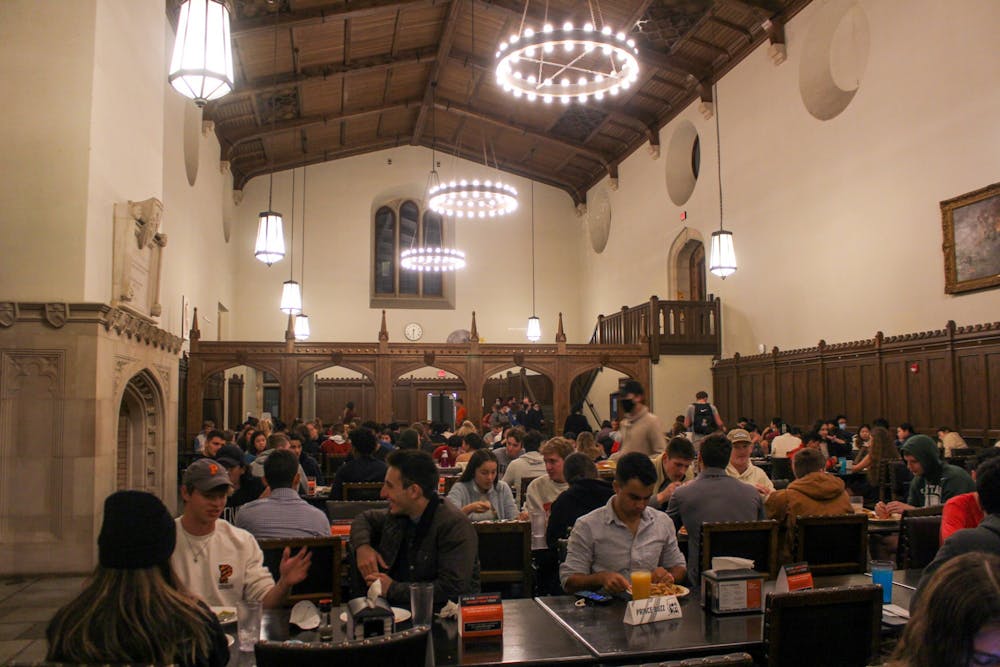At the start of the fall 2021 semester, campus dining halls were understaffed, leading to high demand for employees. While staffing issues persist, the return of student workers and redistribution of professional staff reduced some of the challenges.
A student manager in the WuCox dining hall, speaking anonymously, told the ‘Prince’ in a phone interview that they used to have approximately eight student workers per shift.
“Right now we have two to three if we’re lucky,” they said.
However, they said that a lot of the volatility in staffing seen earlier this year is subsiding.
“I remember in the beginning of the semester ... every Wednesday shift would always have different people, to the point where there was no use of me asking names, because I didn’t know if I would even see that person next week,” they said. “But mid-semester, I think it started to solidify.”
According to the student manager, the redistribution of some staff from Facilities and the Frist Food Gallery to the dining halls has also been beneficial.
Near the start of the semester, staffing shortages had resulted in some changes in the dining experience. Without enough staff to wash plates, some dining halls resorted temporarily to disposables. The WuCox student manager who spoke to the ‘Prince’ noted that redistribution of workers has upped staff numbers and made a return to “normal plates” possible.
In a statement to the ‘Prince,’ University spokesperson Ayana Okoya said that “Campus Dining continues to deal with staffing challenges, both with the professional staff and its student workforce.”

According to Okoya, Campus Dining “is continuing to offer overtime to its employees and has partnered with Building Services to offer overtime in the evening and on weekends to Building Services staff.”
Still, there is a demand for more workers. Earlier this fall, Campus Dining partnered with Human Resources to host recruitment fairs. Okoya stated that Campus Dining is now working with “local temporary staffing agencies” to fill vacant positions, though “those agencies are experiencing the same staffing issues seen around the country.”
According to Katya Williams ’23, a student dining coordinator at Forbes, the student workforce, which was absent when the school year started, has been a help.
“Forbes was able to stop using only paper plates after the student workers came back,” she wrote in an email statement. Williams also said that while “the professional workers are also short-staffed, they don’t rely on student workers to do anything we didn’t do pre-pandemic.”

“In Forbes, that means spraying plates at the dish counter, running the dishwasher, taking cups, plates, and silverware back into the servery, and at the end of the night for cleanup, wiping tables and mopping the floors,” she said.
According to Williams, prospective student hires were promised a base pay of $13.50 per hour. This is an increase from the $11.20 rate that student dining workers earned pre-pandemic, in the fall of 2019.
“I’m not sure if that did anything,” Williams said.
To the student manager at WuCox, the pandemic took away the sense of community that made dining hall work fulfilling.
“When I was a first-year, I had a group of upperclassmen there to help me through things that created a really vibrant community,” they said. “I think that COVID hit and a lot of us transitioned into virtual jobs that now have an in-person element to them. What that means is that there’s less of an upperclassmen community to support the frosh and sophomores that would be interested in working in the dining halls.”
They also said that “most of the chefs and servers that I had got to work with are either gone, have relocated, or just are working less now” — making the dining hall a “less fun place to work,” and without a sense of community, “not much of a draw, even with the increase in pay.”
Still, they said they very much enjoy their job.
“When I talk to students who used to be dining hall workers, they still have really fond memories of the dining hall,” they said. “But there’s an acknowledgment that things aren’t the same.”
Sandeep Mangat is a staff writer who frequently covers alumni affairs, international student life, and University staff. He can be reached at smangat@princeton.edu and on Twitter @s_smangat.








